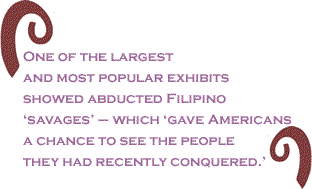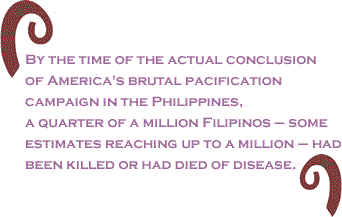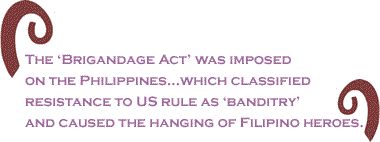
The
following article was originally published as “Remembrance of Decembers Past” in
the Philippines newspaper TODAY.
It is the beginning
of the last month of 2003 - the year America invaded and occupied
Iraq.
Welcome, December, month of solace and tribulation. You
remind us of many things.
The great Janis Joplin made her final appearance with Big Brother and
the Holding Company on December 1, 1968. On the same day in 1957, Buddy
Holly and the Crickets made their debut on the Ed Sullivan Show with "That'll
Be the Day."
On December 1, 1904, the grand St. Louis World's Fair in Missouri, USA came
to a close.
The World's Fair was designed to showcase to Americans the fruits of
their country's unbridled progress. On one side of the fair, astonishing
technological exhibits and feats of scientific prowess. On the other,
displays of the subjugated people of America's recent past.
"[A] practical illustration," as one fair organizer described it, "of
the best way of bearing the white man's burden," referring to Rudyard Kipling's
infamous poem "The White Man's Burden: The United States and the Philippine
Islands," which called on America to enter the imperial stage alongside
the terminally tottering British empire.

On display were exhibits showing America's Negro slaves and
bucolic plantation life, exhibits of American Indians,
and the Philippine Exposition – one of
the largest and most popular exhibits showing abducted Filipino "savages" – which "gave
Americans a chance to see the people they had recently conquered."
A sampling of "Your new-caught sullen peoples, / Half devil and half
child," as Kipling described the natives of the Philippines – before
they were moved up the evolutionary tree thanks to America's civilizing presence. That'll
be the day.
While the 1904 St. Louis World's Fair was a story of racial supremacy
intended "to
rationalize deep social divisions in a society that proclaimed its belief
in equality," it was also an imperial narrative that sought to make
the link "between Manifest Destiny on the home front, and America's
burgeoning drive to expand overseas."
Welcome, December, month of comfort. Make us remember.
International Human Rights day falls on December 10 - the day the UN General
Assembly adopted the Universal Declaration of Human Rights (UDHR) in 1948.
UDHR - the badly dented armor crafted to protect the world from tyrants,
agents of wickedness and aggressor nations.
Welcome, December, month of transgressions; help us make the needed links.
Exactly fifty years before the passage of the UDHR, on December 10, 1898,
representatives of Spain and the United States signed the Treaty of Peace
in Paris.
The Treaty of Paris gave disgraced colonialist Spain the peace of $20,000,000 – courtesy
of America's coffers. And through the Treaty, America acquired the
Philippines along with other Spanish "possessions."
Peace for the predators; slaughter for the prey.

America chose an opportune time to enter the stage. At the time of
the signing of the Paris "Peace" Treaty, the Spanish colonial
regime was already crumbling, battered by the offensives hurled by
Filipino revolutionaries
who were already setting up the first republic in Asia.
But this mattered little to the new empire determined to claim
new territories. And
so by the time of the actual conclusion of America's brutal pacification
campaign in the Philippines, a quarter of a million Filipinos – some estimates
reaching up to a million – had been killed or had died of disease as
a result of the US occupation.
So savage was America's imperial army in the Philippines that the
normal casualty statistics of war experienced a horrific reversal. According
to figures made available to the US Congress during the Filipino-American
War, "US troops killed fifteen times as many Filipinos as they
wounded."
A sample: Report for April, May, June and July, 1900 of Major-General
Wheaton, commander of US forces in Northern Luzon (whose people the US government
said "received us with open arms"): Filipinos killed,
1,014; Filipinos wounded, 95.
"People do not need to be taught so much as they need to be reminded," wrote
Kenneth Champeon, paraphrasing Samuel Johnson.
Reminded, perhaps, of other Decembers such as December 21, 1898 – the
day US President William McKinley issued the infamous Benevolent Assimilation
Proclamation which instructed the American army to forcibly impose
American
sovereignty over the Philippines.
"[W]e come, not as invaders and conquerors, but as friends, to protect the
natives," said McKinley as mighty imperial America prepared to
destroy the fledgling Philippine Republic.
Familiar words. The British virtually spluttered the same rhetorical
poison when they entered Baghdad in 1917. As did the Bush administration
when its forces penetrated the Iraqi capital just months ago.
Remember Mr. Mission Accomplished waving onboard the USS Abraham
Lincoln last May 1, 2003 - waving in front of a backdrop made by
the Whitehouse
declaring, well, "Mission Accomplished"?
So painfully familiar.

The US still officially views the end of Filipino-American
hostilities on the date President Theodore Roosevelt issued
his "Proclamation Ending
the Philippine-American War" on July 4, 1902 even though
armed resistance to American rule continued well beyond the first
decade
of the 20th century.
In fact, right after Roosevelt's own "mission accomplished" proclamation,
the "Brigandage Act" was imposed on the Philippines. An act
which classified resistance to US rule as "banditry" and
which caused the hanging of Filipino heroes such as Macario Sakay,
who was part
of the revolt against Spain and whose forces -- years after Roosevelt's
proclamation -- continued to resist American occupation.
By 1903, US military operations had commenced against Muslim
Filipinos "aimed
at exerting full U.S. control over the southern islands." "Full
US control" being equal to America's earlier definition of "peace" for
the Philippines: in March 1906, in one its infamous massacres,
US troops fired upon and slaughtered 900 Filipinos - 900 men,
women and children
who
had sought refuge in a volcanic crater on the southern Philippine
island of Jolo.
A feat - not a horror - that did not go unnoticed by President
Roosevelt, who immediately commended the general who had
led the Jolo massacre: "I
congratulate you and the officers and men of your command upon
the brilliant feat of arms wherein you and they so well upheld
the
honor of the American
flag."
Support the troops.
"Take up the White Man's burden, / In patience to abide, To veil the threat
of terror / And check the show of pride." Remember Rudyard
Kipling's poem?
Remember Kipling - dead bard and worthy companion of an American
empire still dreaming of new conquests.
Remember Kipling, who was awarded the Nobel Prize for literature
in 1907 – the
year after the slaughter of Jolo. The Kipling who was born
on December 30, 1865.
Let us begin the last month of a most turbulent year. Welcome, December. You
remind us of many things.
Renato Redentor Constantino
can be contacted at [email protected].





























